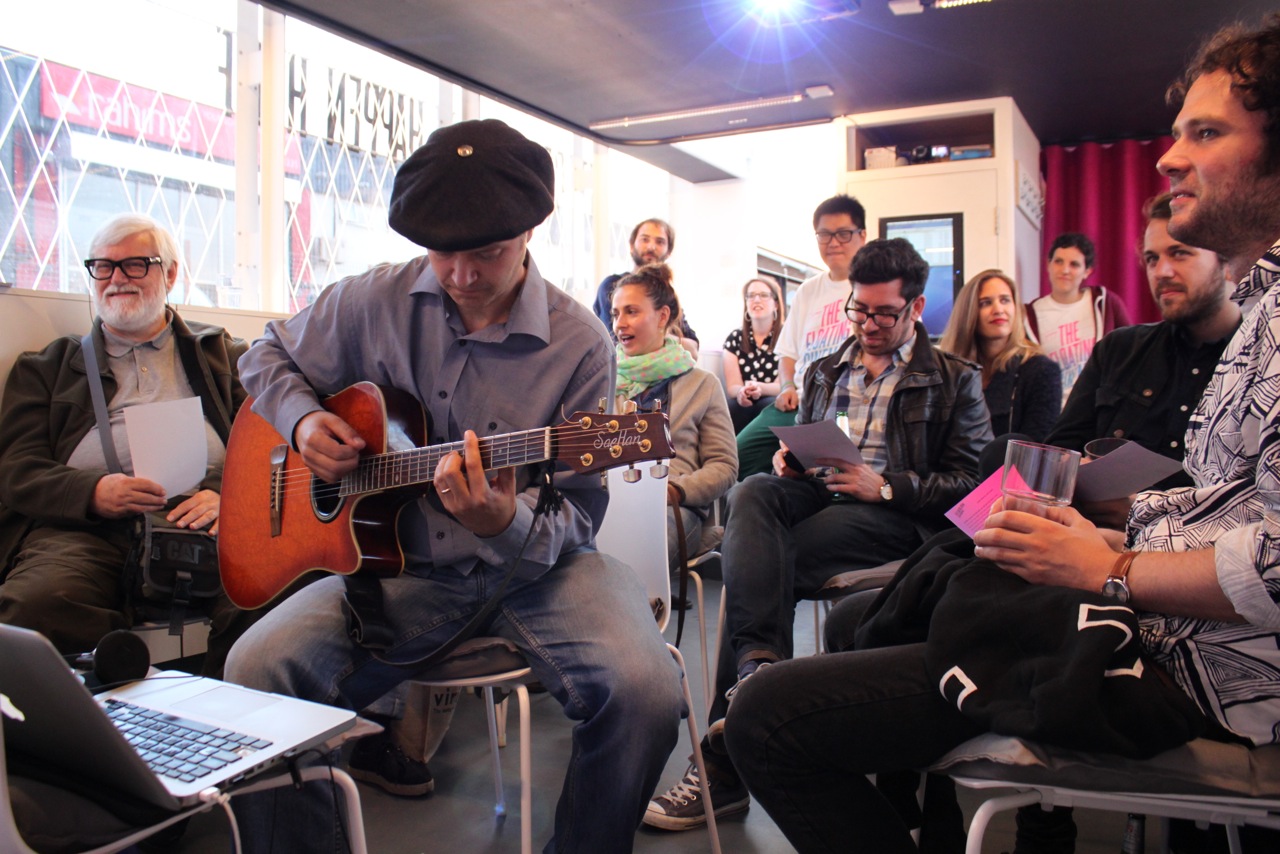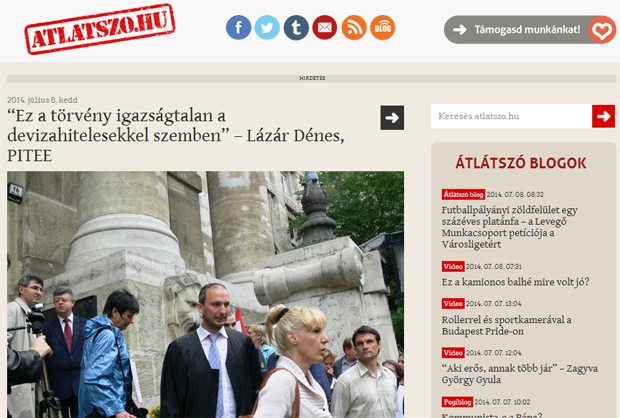25 Jul 2014 | Brazil, Events, United Kingdom

(Photo: Nina Pope for Contra Band)
Contra Band is a new commission, by Leah Lovett, which brings together musicians and audiences from Brazil and the UK for an experimental live performance of songs censored in both countries between 1964-1985. These dates mark the duration of the military dictatorship in Brazil
Contra Band Tours – Saturday 26th July (6-7pm & 8-9pm)
Audiences are invited on a floating journey, whilst we connect to a live link up with CASA 24, an artist led venue based in Rio De Janeiro. Musicians in both venues will attempt to learn, play and understand their counter parts censored songs.
Contra Band Talk – 3.30-4.30pm
Artist Leah Lovett will be joined by Julia Farrington and Melody Patry from Index on Censorship for a discussion examining issues of cultural censorship within Brazil, explored in Lovett’s new live performance Contra Band for The Floating Cinema. The talk will take place at Kings Place.
Lovett draws on her experience of collaborating with musicians both in London and Rio de Janeiro, and will share her research into cultural creative strategies which respond to political instability and creative invisibility during the Brazilian military regime. Index on Censorship will examine the current challenges facing online freedom of expression, exploring the country’s growing profile in global internet governance debates and the potential consequence of its domestic internet policies.
Index on Censorship is an international organisation that defends and promotes the rights to freedom of expression. The inspiration of poet Stephen Spender, Index was founded in 1972 to publish the untold stories of dissidents behind the Iron Curtain. Today this organisation fights for free speech, challenging censorship globally whenever and wherever it occurs.
Leah Lovett is an artist and writer currently researching a PhD at the Slade, UCL, with support from the AHRC. Her project investigates the spatial politics of Brazilian theatre director Augusto Boal’s invisible theatre as a means of opening up questions and possibilities for her own performance-based practice.
BOOKING DETAILS
Talk: BOOK HERE Free (booking essential) – 15.30 – 16.30 (taking place at Kings Place)
Tour Tickets: BOOK HERE £5.00; £3.00 conc. – timings 18.00 or 20.00 (on-board The Floating Cinema)
24 Jul 2014 | Digital Freedom, News, United Kingdom

(Photo: Shutterstock)
Last week, the social web, at one end of its endless, pendulum-like swings between mawkishness and self-righteous fury, discovered a letter from the head teacher at Barrowford primary school, East Lancashire. It was a sweet-natured letter, congratulating students on their exam results and then going on to note all the things exams can’t measure and examiners don’t know:
“The people who create these tests and score them do not know each of you the way your teachers do, the way I hope to, and certainly not the way your families do.
“They do not know that many of you speak two languages. They do not know that you can play a musical instrument or that you can dance or paint a picture. They do not know that your friends count on you to be there for them or that your laughter can brighten the dreariest day.”
…and so on; examiners did not that “know that you have travelled to a really neat place or that you know how to tell a great story ” etc etc etc.
All very sweet sentiments, and new and traditional outlets went crazy for it. The letter went viral, and then the mainstream media, including BBC Radio 4’s The Today Programme, covered the fact the letter had gone viral.
There were a few problems with the well-meaning letter, though. As Toby Young pointed out in the Telegraph, it was incorrect to say the people who “scored” the children’s Key Stage 2 achievements “do not know each of you the way your teachers do”; part of the assessment is done by teachers at the schools.
Meanwhile, children in East Lancashire do not, generally, go to “really neat” places. American kids go to “really neat” places. Barrowford kids might, say, get taken to Turf Moor to see a Burnley match, or more likely at this time of year, Blackpool Pleasure Beach, and it would be proper good.
The reason for these disparities was simple: large sections of the letter had been lifted from elsewhere; apparently, it’s been circulating in various forms since originally being written by a Mary Ginley of Massachusetts in 1999.
When various people (including me) pointed this out on Twitter, they were seen as being somewhere between the Grinch and ISIS in terms of spoilsport misanthropy. “So what if it wasn’t original?” we were told. The sentiment was correct, and that’s what was important.
It may seem unduly curmudgeonly to complain about a rural school’s end of term letter, but the point of interest here is how quickly it spread, and how blase people have been about the basics of who actually wrote it.
Consider another example: after Algeria went out of the World Cup, it was widely rumoured on Facebook, Twitter and other networks that the team had donated its fee for the tournament to “Gaza”; not the ICRC or MSF, or even Hamas, just vague “Gaza”.
It felt good, and it felt nice, and it was plainly not true. But no one really cared whether it was true or not because (a) Algeria had been quite an enjoyable team to watch, b) people wanted to think someone was doing something about Gaza, and c) well, the Algerian team were Muslims, so they’re probably concerned about Palestine (I never said this was a well-thought out view).
This pattern was repeated when German Muslim player Mesut Ozil was similarly reported to have donated his fee to “Gaza” after his team’s eventual World Cup triumph. The news spread like wildfire, because people wanted it to be true. It wasn’t. Ozil had already pledged his cash to projects in Brazil.
The Gaza conflict has provided more of these moments: a picture of thousands of Orthodox Jewish men protesting in New York is widely touted as a pro-Palestine protest; it is not. It is taken from a protest against Israeli conscription laws in March; a meme circulates quoting actor Robert De Niro comparing Israel to a mad dog; there is no evidence that he has ever said this.
But these things, like the school letter, circulate because they feel right and they make us feel good.
As the old line says “a lie will go round the world while truth is pulling its boots on”. The speed with which we can now move information around surely compels us to be even more mindful of this fact. And yet, what’s the answer? Social media thrives on the instantaneous; slowing it down could be severely damaging to the positive aspects of it. Draconian Chinese laws on “spreading rumours” are reported to have severely affected the number of interactions on social media. In democracies, it would likely be impossible to prevent feelgood-but-false memes, as well as straighforward propaganda, to spread without a massive crackdown on free expression.
For a long time, the web has demanded that we “become our own editors”, ensuring that we take in a broad amount of information rather than merely reading the sites we like on the topics we like, avoiding challenging or new ideas.
But the editorial process must always involve a high level of scepticism; some of the greatest journalistic failures of the past 40 years, such as the Hitler Diaries Hoax, or Piers Morgan’s disastrous publishing of fake pictures of Iraq war abuses in the Daily Mirror, came down to an editor’s and others involved required scepticism being overwhelmed by a story that was simply too good to be true. Disaster ensued.
The same must apply for anyone who thinks themselves vaguely “active” in the political sense on the web. Inaccurate information ultimately damages your cause. So the next time you see a meme on NHS spending, Israel, or whatever it is you care about, think before you tweet: Is this too good to be true? Do I have any way of checking this for myself?
This article was published on July 24, 2014 at indexoncensorship.org
24 Jul 2014 | Hungary, Mapping Media Freedom, News, Politics and Society

Hungarian NGOs are facing a rough summer: The Government Control Office (KEHI) has launched a series of investigations into grants they received from the Norway Financial Mechanism. Now the Council of Europe’s Commissioner for Human Rights, Nils Muižnieks, has written to János Lázár, Minister of the Prime Minister’s Office to express concern over the situation.
In the letter, Muižnieks told Lázár that he had been informed by several parties that audits were being conducted over the grants. A forthcoming report will further detail the monitoring that Muižnieks was conducting around media freedom in the country. For his part, Lázár has responded to the letter from the COE commissioner.
As Index reported on July 8, the government controls come after a long smear campaign with members of the Fidesz government accusing these NGOs to be proxies for “foreign interests”, and that Norway is using the program to exert direct political influence on Hungary.
“There is panic and uncertainty in the Hungarian civil society. In this respect, the controls are very effective, even if there will be no consequences,” says Tamas Bodoky, editor-in-chief of Atlatszo.hu, an investigative journalism outlet also targeted by the KEHI audit.
Atlatszo.hu decided not to comply with the government inspection, regarding it as unlawful. They say that KEHI is an agency overseeing government financial matters, and does not have the authority to investigate financing for NGOs. However, they have nothing to hide, so they published all relevant records concerning the use of funds on the website of their partner organisation, Asimov Foundation.
A number of NGOs followed Atlatszo’s example, but it is unclear what the repercussions of this decision might be. According to Bodoky, KEHI could freeze their bank accounts, suspend their VAT number, and fine them as well.
It is difficult to portray these NGOs as strongly opposing the Fidesz rule. Some of the organisations receiving grants from the Norway Financial Mechanism have been involved in anti-government protests, but others have fruitful cooperation with the government. The vast majority of grant recipients have no political involvement at all.
Bodoky believes the government controls are a small-time retaliation for the decision of the Norwegian government to suspend the payments from the EEA and Norway Grants. This fund represents the financial contribution of Norway, Iceland and Liechtenstein towards reducing economic and social disparities in the European Economic Area (EEA).
Hungary was set to receive 20 billion euros in the 2014-2020 period from this fund. However, the Hungarian government recently made important changes to the system by which EU and Norway development grants are administered. They did not consult with the donors. As a result the Norwegian government suspended the payments.
This measure did not affect the considerably smaller NGO Fund, operated by a Hungarian consortium of NGOs. The overall objective of this fund is to “strengthen civil society development and enhance contribution to social justice, democracy and sustainable development”.
The programme focuses on projects dealing with the human rights of minorities, good governance, combating racism and xenophobia, combating discrimination, social exclusion, gender inequalities and gender-based violence.
Some members of the NGOs administering the fund appear to have links to Politics Can Be Different (LMP), a small liberal party. Apparently this was the reason why State Secretary Janos Lazar, the “strong man” of the Fidesz government decided to write an open letter to the official representative of the Fund’s donors, Vidar Helgesen, Norway’s Minister of EEA and EU Affairs, accusing the Norway government of intervention into the internal affairs of Hungary.
Deputy State Secretary Nandor Csepreghy said in an interview that the Hungarian government would prefer Norway’s Civil Fund to provide financial support through the Hungarian government, whose “legitimacy comes from society and the voters”. Csepreghy believes that any other scheme can be interpreted as a direct involvement into Hungary’s internal political affairs.
Recent reports from mediafreedom.ushahidi.com:
Hungary: Companies owned by local council abrogate advertising contracts
Hungary: Investigative journalism group says it will not comply with government audit
Hungary: Officials target RTL Klub after critical reports
Hungary: NGO with close ties to Hungarian government will ‘monitor’ media attacks
Hungary: Blogger resigns after political pressure
This article was posted on July 8, 2014 at indexoncensorship.org
21 Jul 2014 | Campaigns, Statements
To:
Isabelle Falque-Pierrotin
Chair, Article 29 Working Party
EUROPEAN COMMISSION
B-1049 BRUSSELS
DG Justice
Dear Ms Falque-Pierrotin,
We are writing to express our deep concern over the effects of the so-called Right to be Forgotten ruling, issued by the Court of Justice of the European Union (ECJ) on May 13, 2014.
Since the ruling was issued, Index on Censorship, an international freedom of expression charity, has consistently and repeatedly expressed reservations about the failure of the judgement to include recommendations for oversight mechanisms and provisions that would ensure freedom of expression and information rights, as well as obligations, are balanced with privacy rights. We are disturbed both by the loose wording of the ruling and by recent comments from European information commissioners that appear to suggest that authorities are making a default presumption that – in the majority of cases – privacy rights trump those of free expression and right to information.
Index is concerned that without the rapid introduction of uniform, Europe-wide guidelines from regulators on the implementation of, and oversight process for, all search engines implementing Right to be Forgotten, the system will lead to swathes of information that should be publicly available being hidden from sight. This includes not just serious journalism but also information about, for example, individuals who use comment lines below articles as a form of harassment.
Index calls on Article 29 as a matter of urgency to:
• issue detailed guidance on the types of information that can be considered “irrelevant” by search engines. Simply asking search engines to have a due regard to information that is “in the public interest” is insufficient guidance;
• detail an appropriate mechanism of oversight to ensure that it is possible for data protection or other relevant national and European authorities to examine any search engines’ decision on a Right to be Forgotten request;
• include an appeals mechanism that allows publishers of content who have had links removed to be able to challenge that decision. Index understands the need to balance privacy rights with rights to information and freedom of expression rights. However, we are concerned that the recent actions of the ECJ and data protection authorities has failed to sufficiently taken into account the latter, and we would urge greater consultation with civil society groups on the implementation of this ruling and in the development of future data protection guidelines to ensure that that these rights are protected.
Yours faithfully,
Jodie Ginsberg
CEO, Index on Censorship
Copies to: European information commissioners
Letters from the Society of Editors:
Letter to Isabelle Falque-Pierrotin on the Right to be Forgotten
Letter to the Prime Minister David Cameron on the Right to be Forgotten



